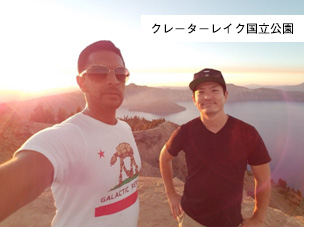
|
|||||
|
|||||
|
留学したらどんな生活? このコーナーでは、実際に留学中の学生からの生の声をお届けします!
<夏休みロードトリップ> こんにちは。小林です。私は現在、カリフォルニア州のセリトスカレッジという大学に通っています。今までに留学についてのコラムを何度か書かせて頂きましたが、今回は留学生の夏休みの過ごし方について書かせて頂こうと思います。
アメリカの大学は学校にもよりますが、一般的に約3か月の休みがあります。今年の夏休み、私は友達とアメリカ国内を"ロードトリップ"してきました。ロードトリップというのは、名前の通りですが、飛行機などを使わずに車で旅行をすることです。私たちは、オレゴン州とカリフォルニア州の北部を6日間かけて周りました。目的地は、クレーターレイク国立公園、ポートランド市、レッドウッズ国立公園に行きました。今までに、ヨセミテ国立公園とグランドキャニオンに行ったことがありましたが、今回行った2つの国立公園は雰囲気のまた違った良さを持っている公園でした。クレーターレイク国立公園については、湖の水がとても透き通っておりあんなに青い湖は人生で初めて見ました。
オレゴン州のポートランド市については、現在住んでいる南カリフォルニアとはまたガラッと雰囲気が違っており、住んでいる人がより落ち着いて生活しているように思えました。他に今回の旅行で感じたこととしては、アメリカ人の友達と二人で旅行をしたのですが、文化の違いなどもあり、旅行プランを決める時に意見の食い違いがあったりと少しだけストレスを感じることもありましたが、同じ環境で育った日本人と過ごすのとは、また違った面から自分自身を見つめ直すいい機会になったのではないかと思いました。 アメリカに住み始めて2年半が経とうとしていますが、まだまだ行ったことがない場所が山ほどあります。留学をされる機会があれば、勉強はまず第一に大切ですが、その上でこのような楽しみ方も留学の一つの醍醐味ではないかと思います。 |
|||||
|
|||||
| このメールマガジンは、IGEニュースレターにご登録頂いた皆様、またIGE関係者の方にお送りしております。留学にご興味がなく、このニュースレターを希望されない場合は、IGEニュースレターの配信は、直ちに停止します。このメールマガジンを今後ご不要な方は、誠にお手数ですが、件名に「IGEニュースレター配信停止希望」とお書きになって、以下に本メールが送られてきたメールアドレスをご記入の上ご返送ください。メール転送サービス等をご利用の方は「IGEニュースレター」にご登録のメールアドレスをご記入ください。 お名前→ 停止希望のメールアドレス→ 返送先 news@weexchange.com このメルマガの著作権はIGEにあります。無断転載はお断り致します。 |






